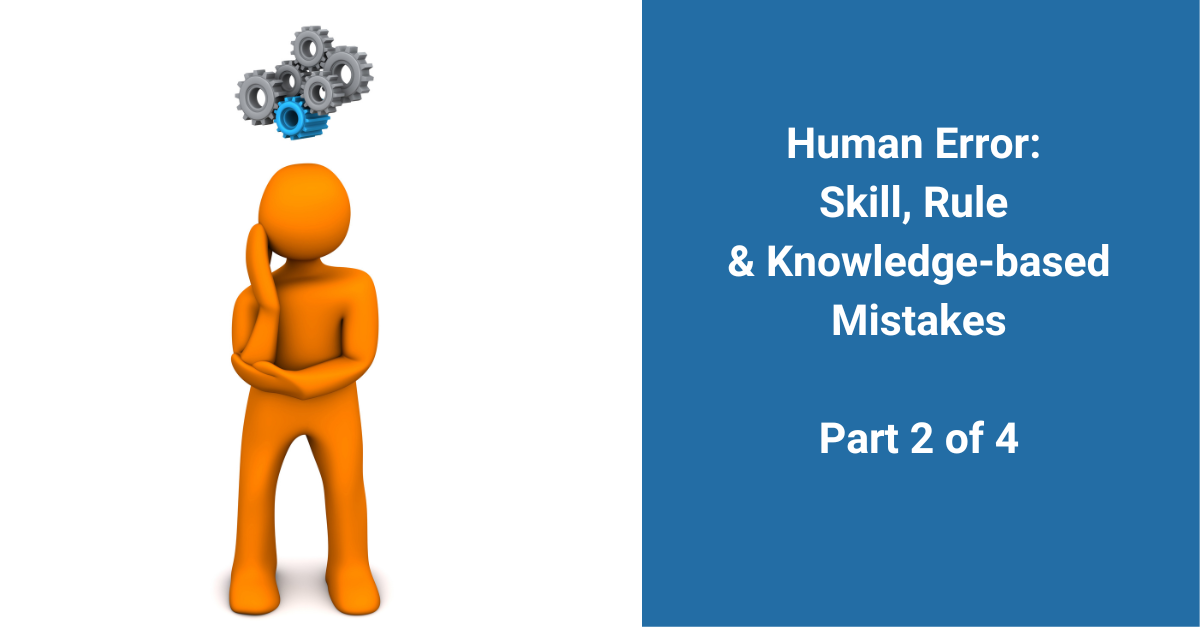Skill-based Errors

Last week, I posted an overview of the Skills, Rules, Knowledge (SRK) Model developed by Jens Rasmussen, and the Generic Error-Modelling System (GEMS) developed by James Reason. Today, I’m focusing on skill-based errors. Understanding these models can improve our knowledge of how workers make mistakes.
As I mentioned in last week’s post, we often think of mistakes as character flaws, but these research models reveal that workers will make mistakes due to normal thought processes. If you frequently try to correct the “character” of your workers by telling them to “try harder,” “concentrate,” “think before you act,” learn about how you can stop human error more effectively.
What are Skill-based Errors?
Skill-based errors were classified by Reason as slips and lapses. Slips are when someone does something but it is not what they intended to do. Lapses are when we simply forget.
In our 5-Day TapRooT® Advanced Root Cause Analysis Team Leader Training, we go into more detail discussing short-term and long-term memory, and how this affects the performance of our workers.
Most workers want to do their jobs as assigned but work environments are full of interruptions, workload demands are often high, and fatigue and stress cause issues. Our memories do not always serve us well.
There is variability in human performance on any given day due to these factors and more. Instead of focusing on a worker’s errors and blaming the worker for failures of memory or lack of attention, one thing we can do is look into the factors that are making it easy for workers to make errors.
Examples of Skill-based Errors (Slips and Lapses)
Again, a lapse is a failure of memory. Essentially a lapse is “I forgot what I was doing or what I was going to do.” Forgetting to restore normal valve settings after maintenance is a lapse.
Slips are errors where the intention is correct, but there is a failure of execution. A slip is, “I knew what I was doing or going to do, I just did it wrong, (or didn’t do it).” Typing with the caps lock turned on your keyboard when you want lowercase is a slip. (Keyboarding is a learned, skill-based task for many people. The worker could do the task without really thinking about it, but did it wrong.)
Slips and errors often happen because the worker was interrupted during the task.

Are Skill-Based Errors Common?
Skill-based errors are extremely common. They can happen when:
• the worker knows how to perform the task.
• the worker has hundreds of hours of experience.
• the worker is doing very simple tasks (drinking coffee).
These errors happen to our most trained, competent, dedicated workers. At this point, you may be thinking about some slips and lapses of your own!
A TapRooT® Root Cause Analysis investigation can identify skill-based errors to analyze for root causes. Then, you can develop corrective actions to make them less likely to occur.

Mark your Calendar for our Stopping Human Error Course
Join us in Austin, Texas, October 24-25, 2022 to learn more about stopping human error. You’ll learn tried and true strategies as well as how to design a human performance improvement program. It’s the last time this course will be offered this year!
Join me next week
In next week’s post, I’ll focus on how to practically apply knowledge about these models to rule-based errors. If you missed last week’s post overviewing the Skills, Rules, Knowledge (SRK) Model developed by Jens Rasmussen, and the Generic Error-Modelling System (GEMS) developed by James Reason, read it here.
References for this Series
The Skill, Rule, and Knowledge-Based Classification



